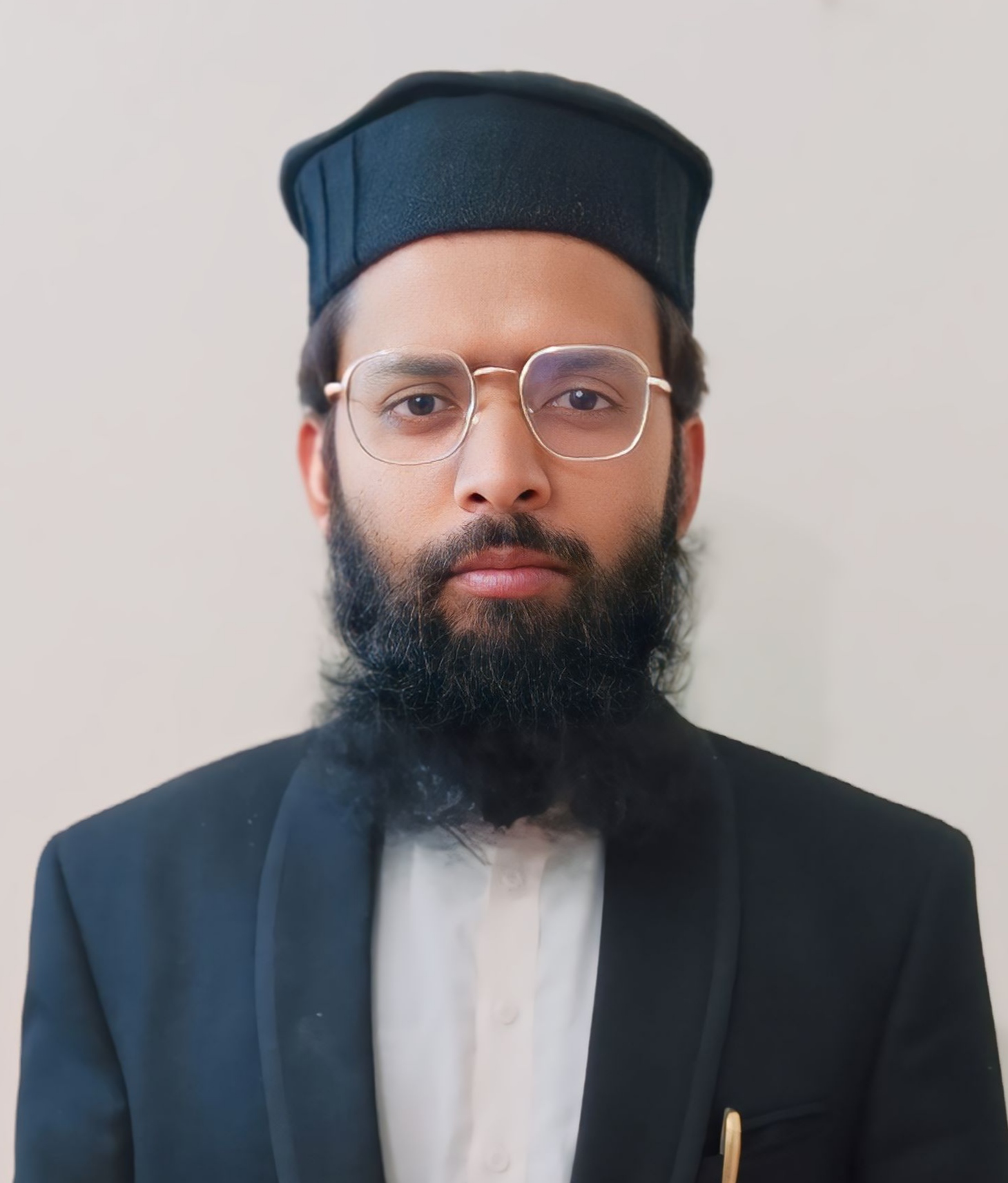Overview

Islam is the religion sent by God Almighty. إنَّ الدِِينَ عندَ اللہِ الْإسلَامُ Translation: In the sight of Allah, the only religion is Islam. (Al-Imran: 19) There is no room for any religion other than this one. وَمَن يَّبِتَغِ غَيْرَ الاِسَلَامِ دینُ فَلَنُُّقَبَلَمِ. Translation: Whoever chooses to adopt a method other than this commandment (Islam), that method will never be accepted (Al-Imran: 85).
This religion covers all aspects of life. Unfortunately, the effects of secularism have made this belief and thought disappear from the eyes of a large number of Muslims, which needs to be reformed.
Islam has come to dominate, its followers cannot remain subdued for long. Those who believe in the good news of Rasoolullah and consider the changes in the world are seeing the conflict between right and wrong with open eyes. This conflict is going to reach its climax in the near future in which the believers will finally be successful.
Both intellectual and physical fronts are hot in the world at this time. On the one hand, false ideas are trying to create doubts among Muslims, on the other hand, those who sacrifice everything for the truth are in direct competition with the machines of Europe. The world will be able to fight against the machines of polytheism and disbelief, only the generation whose thoughts will be solid and righteous and whose faith will be transparent. Those who will be well aware of the false thoughts and ideas of the time and will have the ability to distinguish between Islamic thought and non-Islamic thought.
Through this course, an effort will be made to make students familiar with Islamic thought as well as non-Islamic thought in such a way that they can play the role of leadership in their place.
About the Course:
Through this course, one will know the guidance of Islam in all spheres of life, as a result of which the greatness of Islam will be established in the hearts and will be encouraged to fight for its supremacy.
Through this course, the reality of false thoughts and ideas will be clear and compared to them, the mercy and blessings of the Islamic system will be clear in the light of practical examples.
What kind of amazing changes have taken place in the society in the light of Islamic teachings, will be clearly revealed through practical examples and the light of hope will be seen instead of despair regarding the future.
The problems of Muslims at the global level, the struggle of Islamic movements will be gained and a wide canvas for thinking about practical work in their respective places will be revealed.
Course Objectives:
- Formation of individuals for the struggle of Islamic domination.
- Developing the ability to differentiate between individuals between Islam and modern Jahiliyyah
- Trying to popularize Islam as a complete system of life
Benefits of the course:
- This course will build your confidence
- Understanding of contemporary issues will be gained
- The ability to understand problems in the light of Islam will develop
- You will get courage to fight the enemies of Islam on different fronts
Curriculum
Part I : Ideologies
Intellectual aspect of Islam
- The basic problems of life:
- Basic questions
- Sources of knowledge
- The senses
- Material solutions
- Intellect
- Philosophical solution
- A result of the philosophical solution
- Intuition
- Intuitive solutions
- The result of an intuitive solution
- Revelation
- Authenticity of revelation
- The supremacy of revelation
- The place of religion in life:
- The need for religion
- Religion and Man
- Religion and Science
- The concept of Islam is life:
- The materialistic concept
- Imamist concept
- Islamic concept
- The concept of Islam is the universe
- The concept of Islam is man
- The post of caliphate
- Essentials of the office of Khilafah
- Effects of Islamic Theory of Cosmology (on Individual and Collective Life)
- Basic features of Islamic philosophy of life
- Basic Beliefs of Islam:
- Degrees of certainty
- Faith in Allah
- Faith in Messengers
- Belief in angels
- Faith in Scripture
- Faith in the end
- Rational analysis of fundamental beliefs
- Basic Beliefs and Attitudes
- The attitude of the believer
- The attitude of the unbeliever
- Outline and Characteristics of Islamic Civilization
- The belief of Islam is monotheism:
- Existence
- Rational reasoning
- Quranic reasoning
- Tawheed and types of Tawheed
- Arguments of Tawheed
- Effects of monotheism on human life
- Relationship with Allah and its foundations (faith, worship, love, following the Messenger),
- The reality of disbelief and shirk:
- Is it possible to deny God?
- Shirk is an unnatural belief
- Types of Shirk
- Types and Manifestations of Shirk in India
- Effects of polytheism on human life
- Pagan civilizations die out very quickly
- The Creed of Islam:
- The need for prophecy
- Characteristics of Prophets
- Purpose and post of prophets
- The four conditions of a universal paradigm (historicity, completeness, comprehensiveness, practicality)
- End of prophecy
- Relationship with the Prophet and its foundations (faith, obedience, obedience, love)
- Islam’s belief in the hereafter:
- A few natural and rational questions
- The materialist approach
- Effects of Belief in Hereafter
- The difference between the attitudes of a believer and an unbeliever
- The theory of reincarnation
- An Analysis of the Theory of Reincarnation
Part II: The System:
(Practical Aspect of Islam)
- The system of worship of Islam:
- Dev Malay concept of worship
- The monastic concept of worship
- The Islamic concept of worship
- Characteristics of the Islamic concept of worship
- Basic acts of worship (prayer, fasting, zakat, hajj)
- Ethical system of Islam:
- Ethics
- Islamic theory of morality and its characteristics
- Inter-relationship between faith and morals
- The Realms of Ethics and Law
- Good manners (patience, honesty, fairness, honesty, etc.)
- Bad manners (greed, cruelty, deceit, backbiting, pride, etc.)
- Social system of Islam:
- Society
- Reform and training of the individual
- Reform and education of society
- The foundations of Islamic society (unity of Adam, sanctity of Adam, brotherhood, compassion and respect, reconciliation, sense of responsibility)
- Social institutions (family, kinship, neighborhood and neighborhood, neighbor’s rights, mosque, rights and duties, veil, marriage, respect for traditions, education, limits and punishments)
- Family system of Islam:
- The concept of family in the West
- Family goals (child rearing, love, protection, •comfort, sense of responsibility, cooperation)
- Rights of Spouses
- Divorce and types of divorce
- Dislocation
- Curse
- Parental rights
- Children’s rights
- Legacy
- The educational system of Islam:
- Importance of education
- Education in Prophethood
- Evolution of education
- Educational Foundations (concept knowledge, purpose of education, balance, unity of knowledge, construction of character, fulfillment of life, sacred environment, separate education)
- Role of mosque and school
- The tragedy of modern education and its consequences
- Duties of the teacher
- Teacher’s rights
- Economic system of Islam:
- The need and importance of livelihood
- An overview of different economic systems
- Feudal system
- Capitalist system
- Collaborative system
- Islamic economic system
- Economic principles of Islam
- Characteristics of Islamic economic system
- The political system of Islam:
- Non-Islamic political ideologies (monarchy, aristocracy, feudalism, fascism, Nazism, proletariat, democracy)
- Interrelationship between religion and politics
- Islam’s concept of government
- Establishing an Islamic system of government is a duty
- Guiding principles of Islamic political system
- The supremacy of divine law
- Justice among people
- Equality Inter-Muslim Government Responsibility and Accountability
- Shura
- Obedience
- Accountability
- Rights of citizens
- Protection of life
- Protection of Honour
- Protection of goods
- Protection of religion etc
- State’s rights
- Cooperation
- Obedience to the law
- Helping by life and money in defence
- Characteristics of an Islamic State
- The ideological state
- The welfare state
- Soviet state
- A state that protects the rights of all human beings in the world
- Legal system of Islam:
- The difference between religion and law
- Difference between Sharia and Fiqh
- Purpose of Shariat
- Scope of Shari’ah
- Types of knowledge
- Types of Negation
- Source Law
- The Qur’an
- Saint
- Consensus
- Conjecture
- Ijtihad and Conditions of Ijtihad
- Penal system of Islam:
- Objectives
- Deterrence of criminals
- Protection Society
- Atonement
- Sentencing Guidelines
- Lack of curiosity
- Limit as much as possible
- Law of the land
- Implementation by the State
- Definite evidence
- Immutable limits
- Tazeer with limitation
- Motives: Dismissal of crime
- Limitations
- Retribution
- Bachelor adulterer
- A married adulterer
- Slander
- Theft
- Mischief in the land
- Alcoholism
- A look at the limits
Part III Non-Islamic Thoughts and Intellectual Invasion:
Non-Islamic Thoughts
- Secularism
- Communism
- Humanism
- Atheism
- Feminism
- Democracy
- Nationalism (etc.)
(All the above false theories will have to be discussed separately)
Intellectual invasion
- The Holy Qur’an and the Orientalists
- Hadith and Orientalists
- Biography of the Prophet and Orientalists
- Jurisprudence and Orientalists
- Islamic history
- Jihad and Caliphate
- Islamic Hijab
- The position of women in different religions
- Review of religious books
- Dominance of Religion / Iqamah Deen (in light of objections)
Part IV. Brilliant Aspects of Islamic Civilization:
- Characteristics of Islamic Civilization
- Historical relics of our civilization (belief and religion, science and philosophy, vocabulary and literature, legislation, government and empire)
- Philanthropy (the universality of Islamic equality, the lofty vision of Islam. Ten examples from history)
- Equality (In light of historical examples)
- Religious tolerance.
- Principles and principles of religious tolerance
- Examples from history
- Morality of war
- Objectives of War in Islam
- Battle instructions and implementation
Historical examples:
- Kindness to animals (in the light of historical examples)
- Public welfare institutions. (in the light of history)
- Schools and educational institutions
- Hospitals and medical schools
- General and special libraries (love of books, history of different libraries. Behavior of enemies with these libraries)
- Establishment of big cities (7th century to 10th century – Cordoba, Al-Zahra, Granada, Ashley, Baghdad, famous cities of India etc).
Part V: Global Islamic Movements and Global Islamic Problems:
Global Islamic Movements
- Jamaat-e-Islami
- Muslim Brotherhood
- Tehreek-e-Taliban
- Sanusi movement
- Tablighi Jamaat
- An objective analysis of various parties
International and domestic problems of Muslims
- Palestine problem
- The Babri Masjid issue
- The Kashmir issue
- The problem in Syria
- Conflict between Islam and the West in Muslim countries
- Muslim Personal Law
- Waqf
- New discussions on marriage and divorce
Rules & Eligibility
Rules and Guidelines
General Rules:
Please follow the instructions below:
- Actively participate during the class and maintain discipline.
- Respect the instructor and other group members.
- Avoid personal conflicts or comments with other participants during the class.
- Do not interrupt the instructor unless it is for an important matter. Questions and answers will be addressed in the last 10 minutes.
- If you have difficulty understanding any of the discussed points, refrain from arguing. Instead, request a private session with the instructor to clarify your doubts.
- Note-taking during the class is mandatory.
Attendance guideline:
- Be present in class on time. In case of absence, submit a prior request for leave.
- If you have 15 consecutive absences in this course or are absent for 6 consecutive days, you will be expelled from the course.
- A delay exceeding 5 minutes after the class has commenced will be recorded, with three such delays counting as one absence.
Note: Attendance is considered a critical aspect of academic commitment at our institution.
Electronic device guideline:
- Microphones must remain muted during class unless activation is necessary for participation.
- Enter the classroom using the name with which you registered.
Food and Drink guideline:
Consumption of food and drinks is not permitted during class, except for water.
DO NOT JOIN. —– IF
- If you are busy and can’t attend regularly.
- If you are not serious about completing the course.
- If you are just coming for a trial.
- If you can’t attend weekly tests and complete assignments.
- If you can’t make notes.
- If you don’t have proper internet connection and device.
Communication protocols:
- The teacher should be addressed only as ‘Sheikh.’ Do not use any other titles such as Teacher, Brother, Janab, Sir, etc.
- At the end of every class 10 minutes will be allocated for questions and answers can be submitted either by typing in the chat box or by speaking.
- If the Q&A session exceeds 10 minutes, you may request permission from the instructor to leave the class.
- If you have any questions or concerns from the previous week, or if your question remains unanswered during class, you may send a message to the following number or ask the teacher directly with their permission.
- Questions should be brief and accurate since the time for the Q&A session is limited.
Coordinators:
Ka’ab ibn Talha – 0091 9650498479
Timings: All days of the week (10:00 AM – 08:00 PM IST)
The Coordinator will make every effort to respond to you as soon as possible. However, depending on the nature of the question and time constraints, there may be a delay in the response.
Course Assessment:
- FINAL EXAM: 50 marks, (it may include multiple-choice questions or short-answer questions covering the entire course curriculum taught in class).
- VARIOUS ACTIVITIES: 50 marks, (attendance, participation, attention in class, completion of homework, and various assignments).
- To pass the course and obtain the certificate, it is mandatory to score a minimum of 70 out of 100.
Course Duration:
Total duration: 1 Year
Total weeks: 52 Weeks
Total sessions: 104 Sessions
Days:
Time (IST):
Language of class: Urdu language.
Starting Date:
Required texts and resources:
After the lectures, try to engage in discussions on the topic within your circle. Note any difficulties that arise during these discussions and present them in the next class.
- Focus on taking detailed notes. Some book references may be provided during lectures, but it’s not necessary to follow a formal reading list.
- Check the dates for winter and summer vacations in your area. During these breaks, conduct at least three days of classes for your younger sisters. In these sessions, discuss topics you enjoyed learning and facilitate meaningful conversations. Each student should share her experiences after the class.
- If you are affiliated with any religious group, ensure your active participation in their programs. Reflect on how your engagement with the course influences the quality of your contributions to these activities.
Course Fees
All our courses are free of charge, and the institute covers all expenses, including the instructor’s salary, as an act of charity (Sadaqah Jariyah). However, if you wish to contribute to this cause and prefer not to take the courses for free, you are welcome to support the institute.
- Admission Fee: 500 INR
- Monthly Fee: 500 INR
To make the payment, please contact the administrator: 00919650498479
Instructor

Dr. Osama Azeem Falahi
He was born in the renowned city of Azamgarh in Uttar Pradesh, in the well-known village of Chanpatti. He received his Alim & Fazil degree from the prestigious institution, Jamiatul-Falah, in Northern India.and completed his graduation and post-graduation from various universities in India and obtained a Ph.D. in Religious Studies from Punjabi University,on the topic of " Human Dignity in Islam, with Special Reference to War Ethics in the Life of Prophet Muhammad (s)." He has a keen interest in Arabic language and religions and sects. Alongside being an accomplished speaker and reciter, he also serves as a educator, dedicating a significant portion of your time to student orginization.
Email address: osamafalahi999@gmail.com
Time Zone: Indian Standard time.

